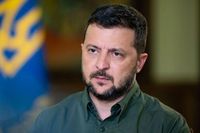Ukrainian President Volodymyr Zelenskyy has highlighted the recent productive cooperation with the United States aimed at establishing a ceasefire for a minimum of 30 days. In a video address to the leaders of the Joint Expeditionary Force (JEF) member countries, Zelenskyy expressed optimism about the ongoing discussions and reiterated Ukraine's readiness for a ceasefire.
"In recent times, we have very active communication with the United States, and not just active, but truly positive and productive. We are working together to achieve a ceasefire—reliable, lasting, for at least 30 days. Ukraine is ready," Zelenskyy stated, emphasizing the collaborative efforts in the peace process.
During the address, which was published on the President's official website, Zelenskyy shared that he had spoken with US President Donald Trump just a day prior. He noted, "We are all united in the opinion that there should be a complete ceasefire. And if Russia escalates the war, sanctions need to be strengthened, especially if they violate the ceasefire when it finally begins." This statement underscores the seriousness with which Ukraine and the US are approaching the potential ceasefire.
Zelenskyy further asserted that the United States and European leaders are aware that Russia's actions compel Moscow to consider peace and an end to the conflict. He remarked, "Moscow must agree to a ceasefire because only then can true peace begin. Diplomacy needs silence. Thank you for your support in this, and we continue close coordination with the United States." This highlights the importance of international support in Ukraine's quest for peace.
In addition to discussing the ceasefire, Zelenskyy mentioned that Ukraine is preparing for a meeting with the coalition leaders who support it, aiming to establish an effective security guarantee mechanism. He expressed confidence that Europe would benefit from such teamwork, stating, "This will help strengthen the entire existing security architecture. Tomorrow—meetings." This indicates Ukraine's proactive approach to securing its future amidst ongoing tensions.
President Trump, following his conversation with Zelenskyy, also called for a 30-day ceasefire to facilitate peace talks. He echoed Zelenskyy's concerns about potential sanctions, warning that the United States would impose stricter measures in the event of any violations of the truce.
As discussions continue, the situation in Ukraine remains fluid. Zelenskyy’s remarks signal a concerted effort to foster dialogue and find common ground, not just with the United States but also with European allies. The urgency of establishing a ceasefire is palpable, as both leaders recognize that any delay could lead to further escalation of the conflict.
In a world where diplomatic relations can be fragile, Zelenskyy’s emphasis on communication and cooperation with the US is a crucial element in navigating the complexities of the ongoing war. The Ukrainian president's call for a ceasefire aligns with the international community's desire for stability in the region.
With the backdrop of heightened tensions and the threat of sanctions looming over Russia, the next steps in this diplomatic journey will be closely watched by both supporters and critics alike. The outcome of these discussions could have significant implications for peace in Ukraine and the broader European landscape.
In conclusion, as Ukraine prepares for a pivotal moment in its history, the collaboration with the United States and other allies will be vital in shaping the future of the nation. The call for a ceasefire is not just a plea for peace; it is a strategic move towards ensuring the sovereignty and security of Ukraine.




